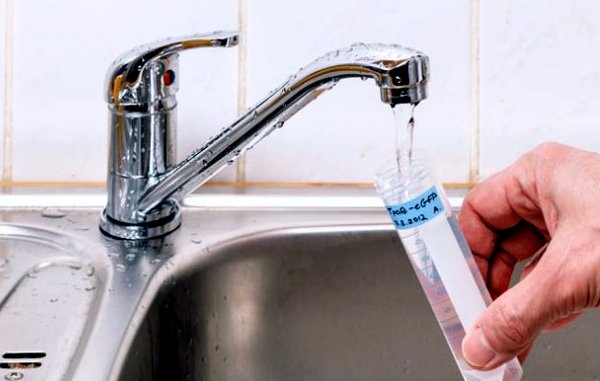After the stresses of summer heat and flooding rains rural homeowners find peace of mind in a positive well water quality test. Combining water testing with timely water treatment safeguards the health of your family in Cross Plains WI, Middleton WI and Waunakee WI.
As a homeowner with a private water supply, you need to be proactive and regularly evaluate your well’s water quality. That means having a qualified professional test it at least once a year. Twice a year is a wise choice when conditions warrant it – after stressful seasons, excessive rain or snow melt or a negative test in the past. There are dozens of contaminants that can creep into your water supply and taint well water quality in a short time. It’s your well so the quality of its water is 100% your responsibility.
Summer is the season with the most demand on water systems, so stresses and contaminants are likely to show up in fall and early winter. Evaluating water systems and completing in-depth water testing now makes sense. You don’t want water-related problems during a long, cold winter, do you?
Plan A Timely Water Quality Test
Scheduling a regular annual inspection of your well is important – and often overlooked. Spring is the most common time, but several factors go into choosing the best time. If you have concerns or have had a negative report, both Spring and Fall make sense. How about scheduling tests around the same time daylight savings time begins/ends? That would be easy to remember, right?
Among the contaminants to test for, the top two are bacteria and nitrate. Spring is the time of year bacteria tends to enter well water through wintertime snow melt and runoff. The heavier the snowmelt the more chances of coliform bacteria in ground water. That’s why midsummer and fall are periods when water quality testing often reveals some of the highest levels of bacteria. Bacteria levels climb with heat and humidity.
Nitrates come from animal waste and fertilizers. Increased nitrate levels reflect surface activities in your area. If there’s a lot of construction in your area, or farmland subjected to fall plowing – with manure added – these are opportunities for nitrate to enter ground water. Soil is a great natural filter, but it does not catch it all.
Setting a routine test schedule makes sense, but don’t rely on the calendar alone. If you notice anything unusual like an odor, taste or change in water color, have your water tested. Any unexpected changes are clues something is going on in your well and it’s time to test.

Inspect The Whole Water Well System
A seasons and local activities change, ground water may change as well. After a summertime deluge did your yard flood, or did the property suffer from lack of rain? Did you accidentally hit the well cap with the mower? Take time for a visual inspection of the entire well water system. Its physical characteristics impact an overall review of your water quality. You don’t have to start opening things up and taking them apart just look for obvious signs of change.
Bugs, especially ugly earwigs, carry coliform bacteria inside them. Look for insect activity around components of the system. Even the best “insect-proof” well caps cannot keep everything out. Check the well cap first and then all electrical conduit. Look openings, cracks and leaks. As you inspect components, keep in mind precaution you should be taking every day, including:
- Taking care using mowers and other equipment near the well cap.
- Avoiding the use of pesticides too close to the well cap – bugs are a problem, but chemicals are more dangerous.
- Never placing covers over the well cap and conduit – how many times have you seen an old well cap topped by an old-fashioned coffee can or rusting pail?
Have you explored creative ways to hide the well cap? Homeowners use everything from fake rocks and flower beds to shrubs and mini wishing wells. Professionals recommend you get used to the exposed pipe and keep it clear of all these things. Keep in mind, flowers, shrubs and long grass attract bugs and other critters. Clean airflow is important to the efficient operation of your well.

What Water Testers Look For
With so many possible contaminates, what are routine tests looking for? Regularly scheduled tests look for:
- Bacteria— specifically coliform bacteria, a disease carrying bacteria that can seriously impact human health.
- Nitrates — the free form of nitrogen causing serious illness, especially to very young children. Also indicates there may be other contaminates in the water. Fortunately, nnless you have reason to believe there’s a problem, older wells don’t need to be tested for nitrates as often as newer ones
- Chloride — A high concentration of chloride can indicate contamination from a septic system a nearby landfill, excessive fertilizer or road salt runoff.
- Corrosivity— testing to indicate if water is very alkaline and can corrode household fixtures. Or if lime deposits are likely to build up in pipes.
- Hardness — Determines whether or not you need a water softening system to protect appliances, etc.
- Lead— Lead leaches into well water from old lead pipes and solder. It represents a serious health concern.
Call On Local Pros For Your Water Quality Test
Sauk Plains Plumbing & Pumps has skilled, licensed plumbers on call to review your water system needs and provide the latest water testing tools. From routine water testing to selecting and installing the correct pumps, accessories and water treatments our professionals will determine the best solutions for your home.
Protecting the water you drink, bathe in and cook with is worth the effort, isn’t it? It’s a wellbeing of your entire family.
Call Sauk Plains Plumbing at 608-798-2121 and have our certified plumbers schedule a timely water quality test before winter hits in the Cross Plains WI, Verona, Waunakee or Middleton WI area.
